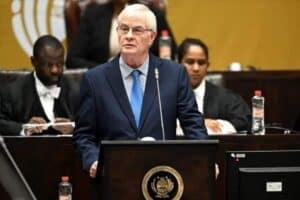All eyes were on the MPC’s announcement, with the repo rate remaining unchanged, and President Ramaphosa making promises in the OPA .

South Africans this week gave their attention to the South Africa Reserve Bank’s (Sarb) Monetary Policy Committee (MPC) decision concerning the repo rate and President Cyril Ramaphosa’s Opening of Parliament Address (OPA).
Thursday saw the 7th meeting of the MPC keeping the repo rate at 8.25%, however, two members wanted a cut.
Repo rate announcement in line with expectations
Waldo Krugell, Professor in Economics at the University North-West says the MPC stuck to their guns. “The governor, Lesetja Kganyago, was emphasising throughout the announcement that the committee wants to see inflation within the target range.” Despite inflation measures moving down, the MPC believed it was not time to cut yet. “I think that is great to make policy, but consumers are struggling and I am really hoping for some relief in September.”
Tshidiso Mofokeng, trainee Economist at the Bureau for Economic Research (BER) says with an improved inflation profile, and inflation expectations drifting lower, he is of a view that Sarb could have the scope to start a shallow-cutting cycle later in September.
ALSO READ: Repo rate remains unchanged at 8.25%
Trade sales performance
The annual retail sales registered a 0.8% rise in May, which is higher than the 0.7% increase registered in April. Mofokeng says general dealers contributed the most to the overall increase. Retailers in textiles, clothing, footwear and leather products did not do well. However, Mokeng suggests retail will still add positively to Quarter 2 GDP, barring an unlikely steep cut in June.
When it comes to motor trade sales, sales declined in May by 8.6%, while in April there was an annual increase of 3.4%. On a monthly basis, motor trade sales declined by 4.9% in May, from a 6.2% rise in April. “The steep decline in new vehicle sales is indicative of cash-strapped consumers shying away from big-ticket purchases.”
Another decline was registered in the annual wholesale trade sales. Sales declined by 6.6% in May after a 0.7% uptick in April. On a monthly basis, wholesale trade sales fell by 3.6% in May compared to a 5.8% increase in April. “Average real sales in April and May were largely in line with quarter 1, which means that June will play a big role in determining the sector’s contribution to GDP.”
ALSO READ: Transnet secures R18.5bn loan to address rail and ports network issues
Promises by President Ramaphosa
Another major event this week was the OPA, which saw the president outlining the plans he has for the country. Lisette IJssel de Schepper, chief economist at BER says Ramaphosa emphasised the Government of National Unity (GNU) would focus on driving inclusive economic growth and job creation, reducing poverty, and tackling the cost of living while building a capable, ethical, and developmental state.
“The acknowledgement that improving the competitiveness of our economy and that small businesses and the informal sector are important for inclusive growth and job creation is welcome.”
She says the president’s address made it clear that the BEE is not going anywhere. A form of income support for the unemployed in the country is underway, this is expected to be different from the current social relief of distress grant. He made it known during his address that the government will continue to pursue the implementation of the National Health Insurance (NHI).
The GNU has also given Operation Vulindlela (OV) a thumbs up. OV’s phase 2 is set to begin, which includes a focus on local government, and the core of service delivery. De Schepper says Phase 1 of OV has been successful on a number of fronts, such as energy, while progress on some has been slower.
ALSO READ: ‘Immediately address SA’s economic challenges’ – First priorities for the GNU
South Africa to be off the grey list in 2025
De Schepper touched on Finance Minister Enoch Godongwana’s Budget Vote, where he mentioned that the National Treasury is working on signing agreements within the water and transport sectors to fast-track private sector participation.
She says the Budget Vote also touched on progress being made on getting SA removed from the ‘grey list’ by 2025. He also mentioned that more infrastructure-related reforms outside of the budget process are planned too.
Parks Tau, the new trade, industry & competition minister, argued that regulation 28 of the Pension Fund Act should be amended to allow pension funds and asset managers to finance industrial policy initiatives. “Merely allowing asset managers to invest at their discretion is fine, but it can become problematic if there is a prescription of how much and where to invest, especially given the fiduciary mandate of pension trustees to act in members’ best interest.”
Meanwhile, the African Development Bank (AfDB) approved a R18.5bn loan to Transnet to support its recovery plan.
ALSO READ: Not much hope for GDP growth in first quarter – economists
CPI’s release for June
She says CPI is the biggest release on the domestic data calendar. After remaining unchanged at 5.2% y-o-y in May, she says they foresee a slight downtick in headline inflation to 5.1% in June, with core unchanged at 4.6%. “This would be the lowest headline inflation print this year. Price pressure is set to slow further during the second half of the year, with CPI expected to average around 4.8% for the full year down from 6% in 2023.”






